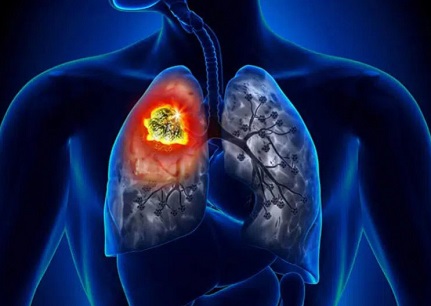Nikhil Prasad Fact checked by:Thailand Medical News Team Jun 19, 2024 1 year, 6 months, 4 days, 18 hours, 13 minutes ago
Cancer News: Lung cancer remains one of the most lethal forms of cancer globally, with over 1.8 million deaths reported in 2022. While smoking is a well-known cause, other factors contributing to lung cancer are not as well understood. Recent research highlights the potential role of chronic inflammation and specific blood proteins, known as cytokines, in the development and progression of lung cancer. This
Cancer News report delves into a study by researchers from Affiliated Hospital of North Sichuan Medical College-China and the China-Japan Friendship Hospital, Beijing that investigated these links using an innovative approach called Mendelian randomization.
 How Certain Cytokines Might Affect Lung Cancer Risk
Understanding Cytokines and Their Role
How Certain Cytokines Might Affect Lung Cancer Risk
Understanding Cytokines and Their Role
Cytokines are small proteins crucial for cell signaling in the immune system. They help regulate inflammation, immune responses, and the production of blood cells. Chronic inflammation, a prolonged and persistent inflammatory response, has been implicated in various diseases, including cancer. Inflammation can cause cellular damage and genetic mutations, potentially leading to cancerous growths.
The Study: An Innovative Approach
The study utilized a method known as Mendelian randomization (MR). This approach leverages genetic variations as natural experiments to determine causal relationships between modifiable factors (like cytokine levels) and disease outcomes. By examining genetic markers associated with cytokine levels, researchers can infer if changes in these levels might causally influence lung cancer risk.
Key Cytokines Investigated
The findings of the study provide important insights into the complex relationship between inflammation and lung cancer.
The researchers focused on several key cytokines suspected to play a role in lung cancer:
-Interleukin-18 (IL-18): IL-18 is involved in immune response regulation and inflammation. The study found that higher genetically predicted levels of IL-18 were associated with a lower overall risk of lung cancer. This suggests IL-18 might have a protective effect against the disease.
-Stem Cell Factor (SCF): SCF is essential for the survival, proliferation, and differentiation of stem cells. Higher levels of SCF were linked to an increased risk of lung adenocarcinoma, a common subtype of lung cancer.
-Interleukin-1beta (IL-1b): IL-1b plays a significant role in the inflammatory response. Like SCF, higher levels of IL-1b were also associated with an increased risk of lung adenocarcinoma.
-Interferon gamma-induced protein 10 (IP-10): IP-10 is involved in immune cell trafficking and activation. The study found that higher levels of IP-10 were linked to a reduced risk of lung cancer in individuals who had ever smoked.
Increased Risk with SCF and IL-1b
The study highlighted that elev
ated levels of SCF and IL-1b increased the risk of lung adenocarcinoma. This underscores the need to understand how these cytokines contribute to the cancer development process. Targeting SCF and IL-1b pathways could become a strategy for preventing or treating lung adenocarcinoma.
IP-10 and Smoking
The finding that higher IP-10 levels reduce lung cancer risk in smokers is particularly intriguing. This suggests that enhancing IP-10 activity might offer protective benefits for smokers, who are at a significantly higher risk of developing lung cancer.
Smoking and Cytokine Interaction
The study also examined how smoking status affected the relationship between cytokines and lung cancer risk. The results showed that the impact of cytokines on lung cancer varies based on whether an individual has smoked:
-Smokers: Among smokers, higher levels of IP-10 were associated with a lower risk of lung cancer, while higher levels of IL-1b increased the risk. This highlights the dual role of cytokines in mediating the effects of smoking on lung cancer risk.
-Non-Smokers: For non-smokers, higher levels of SCF were linked to an increased risk of lung cancer, suggesting that factors other than smoking also contribute to lung cancer risk and that cytokines play a role in these non-smoking-related pathways.
Future Directions in Lung Cancer Research
The findings from this study open new avenues for lung cancer prevention and treatment. Understanding the causal role of cytokines in lung cancer could lead to the development of novel therapeutic strategies targeting these proteins. For instance, drugs that modulate cytokine levels could potentially reduce lung cancer risk or improve treatment outcomes.
Moreover, the study’s innovative use of Mendelian randomization provides a robust framework for future research. By minimizing the confounding factors and reverse causation that often plague observational studies, MR offers a clearer picture of the causal relationships between risk factors and diseases.
Conclusion
This study sheds light on the intricate relationship between inflammation and lung cancer. By identifying specific cytokines that may influence lung cancer risk, researchers can better understand the underlying causes of this deadly disease. The insights gained could pave the way for new strategies in lung cancer prevention, early detection, and treatment, offering hope for millions of people worldwide.
As science continues to unravel the complexities of cancer, such research underscores the importance of a multifaceted approach to combatting this global health challenge. Through continued investigation and innovation, we move closer to a future where lung cancer can be effectively managed and even prevented.
The study findings were published in the peer reviewed journal: Frontiers on Oncology.
https://www.frontiersin.org/journals/oncology/articles/10.3389/fonc.2024.1373380/full
For the latest
Cancer News, keep on logging to Thailand medical News.
Read Also:
https://www.thailandmedical.news/news/new-urine-test-for-early-lung-cancer-detection-shows-promise
https://www.thailandmedical.news/news/unveiling-a-new-player-in-lung-cancer-the-c1orf131-gene
https://www.thailandmedical.news/news/texas-md-anderson-cancer-center-warns-that-covid-19-mrna-vaccines-elevate-pd-l1-levels-disrupting-lung-cancer-treatments-progressing-other-cancers
https://www.thailandmedical.news/news/covid-19-news-sars-cov-2-triggers-epidermal-growth-factor-receptor-signaling-pathway,-leading-to-lung-fibrosis-and-lung-cancer-erlotinib-helps
